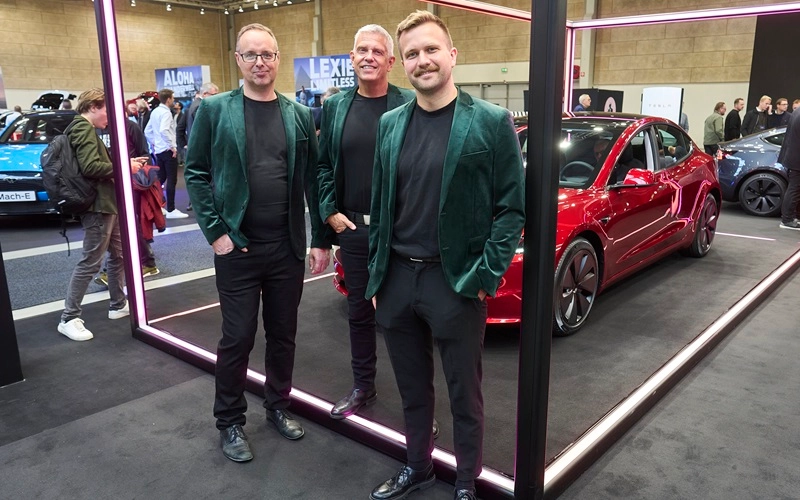Denmark aims to be a leader in the ecological transition. However, there are some issues that need to be addressed to continue driving the sustained development of electromobility.

Kristian Sander Madsen, Advisor at Dansk e-Mobilitet and part of Green Power Denmark, explains to Mobility Portal Europe that “good intentions” often hinder a rapid implementation of charging infrastructure.
In this regard, he emphasizes that one of the main challenges facing the sector is “gold plating” or over-implementation.
“One example is a political agreement that stipulates the need for a running total during the charging process, similar to what is known at gas stations. We have postponed it several times, as it was not feasible,” comments Sander Madsen.
“Although it is now possible and well-intentioned by politicians, it would be a unique Danish demand and would mean higher costs for the charger itself, leading to increased costs for the consumer,” he adds.
Some Danish political authorities would also like to have a card terminal on slow chargers, which, while helpful for the user, would be an additional cost in implementing normal charging infrastructure.
“We hope that the change from the AFI Directive to the AFI Regulation will be of great help and limit the risks of impractical over-implementation,” states the consultant.
Another issue faced by the electromobility sector in the country is that electric vehicle prices are not competitive compared to their fossil fuel counterparts.
Additionally, there is a shortage of small and affordable cars in the Danish market.
“We have a fairly high registration fee for new cars in Denmark, of which electric vehicles are largely exempt,” explains Sander Madsen.
“However, they will be adjusted towards the registration fees we know from combustion cars from 2026 through a staggered model,” he adds.
In 2022, 2023, and 2024, the discount for electric vehicles is 60 percent; in 2025, it is 60 percent; in 2026, it is 52 percent; in 2027, it is 44 percent; in 2028, it is 36 percent.
In 2029, it is 28 percent; in 2030, it is 20 percent; in 2031, it is 16 percent; in 2032, it is 12 percent; in 2033, it is 8 percent; in 2034, it is 4 percent; and in 2035, it is 0 percent.
“We are trying to persuade politicians to freeze the registration fee at the current level and then convert the relatively high registration fee into an ongoing green fee, where you pay according to how much you drive,” indicates the consultant.
Of course, with a differentiation between what a driver of a fossil fuel car pays and one with an electric vehicle.
Denmark Approaches 16,000 Public Charging Points
Through AFID (the old one), municipalities were encouraged to submit their areas to a public tender for Charging Point Operators (CPOs) to install chargers.
“There has been significant interest in this, and we have doubled the publicly accessible charging infrastructure in the last year, and we are now down to about 11 EVs per publicly accesible charge point,” acknowledges Sander Madsen.
It’s worth mentioning that, through their latest public tender, the municipality of Copenhagen reached agreements with various CPOs to install 1000 charge points.
Additionally, another tender is expected to be launched.
“With public tenders, we have acquired many new publicly accessible charging points and are approaching 16,000, mainly installed by our members, serving approximately 190,000 BEVs and 120,000 PHEVs (out of around 2,800,000 in total),” comments the consultant.
Can Denmark meet the objectives set by AFIR?
According to Sander Madsen, the country has the potential to meet the goals established by the European Alternative Fuels Infrastructure Regulation (AFIR).
“There is significant interest from CPOs in installing more chargers for light vehicles. This means that if some points are missing, there will likely be CPOs willing to install them. At least that’s been our experience so far,” explains Sander Madsen.
“AFIR ensures a somewhat consistent implementation across Europe, ensuring a well-connected union where electric transport is possible. Although we would like to see even higher ambitions, we understand that the current version will already be problematic for some parts of the European Union,” he adds.
Read more: eMobility debate: What are the industry leaders’ perspectives on the AFIR?
More About Green Power Denmark and Danish e-Mobility
Green Power Denmark is a non-commercial business organization that brings together around 1,500 members from across the green energy value chain.
It represents companies in the renewable energy industry, owners and developers of renewable energy systems, electricity companies, distribution system operators (DSOs), energy trading companies, and companies that work to refine, convert, and store green electricity.
Additionally, it has “branches” with their own members within the organization.
On one hand, there’s “Fiber Alliance Denmark, I-Energy,” and on the other, “Danish e-Mobility”, where Sander Madsen works as an advisor.
The latter is an interest organization that aims to create the best possible conditions for the green electrification of road transport.
It has members spanning the entire value chain in e-mobility, including energy companies, component suppliers, CPOs, manufacturers and importers of electric vehicles, municipalities, and knowledge institutions.
One of the initiatives they are working on, which is reaching its conclusion, is the FUSE project, in collaboration with the Technical University of Denmark and other entities.
The goal is to inform and accelerate investments in urban charging infrastructure by providing solutions and advice targeted at municipalities and grid operators.








